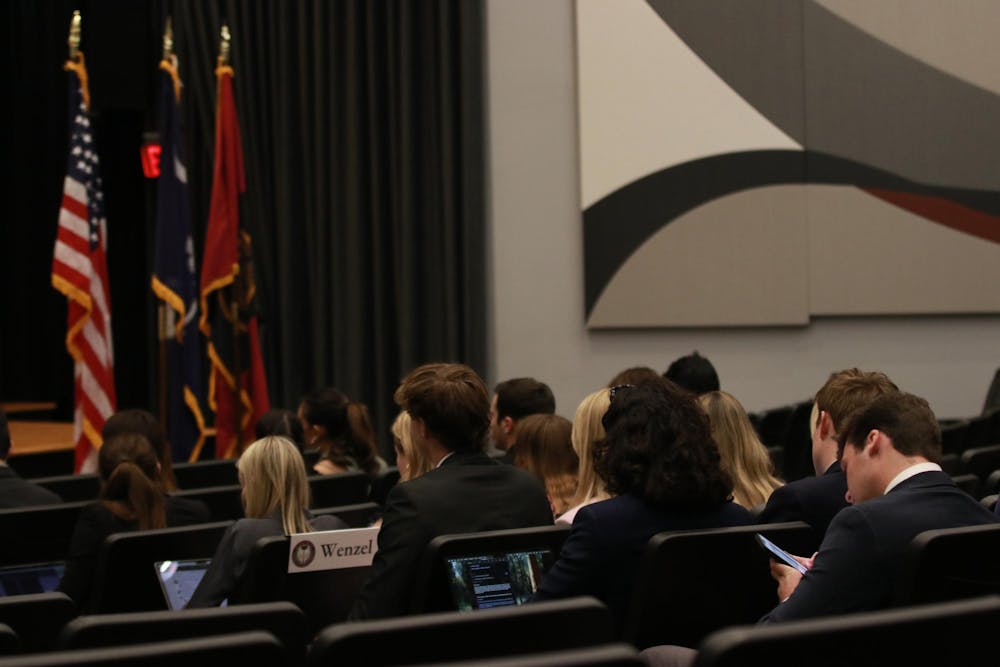The University of South Carolina’s Student Government aims to implement changes to funding distribution for the 2025-26 school year.
The proposal for these changes, created by Student Body Treasurer Ashley Reynolds and her office, along with the student senate finance committee, come in the wake of a smaller budget for the 2025-26 school year.
Compared to last year’s budget of $340,000 which went exclusively to Student Government, this year’s budget will be split between Student Government and a new organization called the Student Organization Funding Assistance Board (SOFAB) for a combined total of approximately $305,000, according to Student Senate Finance Committee Chairman Jackson Matthews.
SOFAB is a brand new board that will open up more opportunities for organizations to obtain funding, and Student Government will continue to do the same.
The main difference between SOFAB and Student Government funding is that SOFAB requests are either approved or denied by university faculty members, while Student Government requests are student-controlled, according to Matthews. They both serve the same purpose, but are overseen by different entities.
About $185,000 will be going to Student Government, while $120,000 will be going to SOFAB, according to Student Life Director of Administration Matt Hinds. SOFAB’s funding is available to both graduate and undergraduate organizations, while Student Government funding is available exclusively to undergraduate organizations.
Any requested amount exceeding $1,500 for programs or $2,500 for conferences and tournaments will be subject to the new funding rubric, which is based on earning points for meeting certain criteria, according to the treasurer’s office.
New criteria rubric for funding allocation
The four criteria categories for programs include physical location and student accessibility, number of expected attendees, learning outcomes met, cost effectiveness and collaboration, according to an outline provided by the student senate finance committee. By working with a university department or another undergraduate organization, programs can get points for the collaboration category.
For conferences and tournaments, the criteria include location and student accessibility, learning outcomes met, cost efficiency and number of attendees.
Depending on how these programs or conferences and tournaments fare regarding these criteria, they will receive one, two or three points for each category. The encompassing point total determines what percentage of funding is granted.
More than 13 points will grant eligibility for 100% of funding, 10 to 12 points will be eligible for 80% of funding, 7 to 9 points for 70%, and 5 to 6 points for 50%.
Matthews said a major goal of these changes is to encourage the criteria listed as well as cost efficiency.
Following the criteria will allow the budget to benefit everyone at the university, as well as extend the budget itself, Matthews said.
A response to past budget trends
Along with the new split budget for this school year, these changes also come in response to the 2022-23 and 2023-24 school years, where the budget ran out months before the year ended.

According to charts provided by the student senate finance committee, last year’s budget saw an increase in funds, but now that the budget has been cut, they line up with those of 2022-23 and 2023-24.
Matthews said the budget during the 2021-22 school year did not run out quickly, mainly because of the COVID-19 pandemic and the lack of events on campus. However, the following year saw the budget run out before the start of the second semester.
“But then you move into 2022 and 2023, and this money is just completely used up by the end of the first semester," Matthews said. “It left organizations that like to have events in the spring out to dry.”
Last year’s budget did not run out until the final student senate meeting of the school year, but the budget was double that of previous years. A primary goal of this new system is to prevent the budget from depleting quickly when it is cut back to that of previous years.
NACE competencies
USC follows the National Association of Colleges and Employers (NACE) Competencies structure as well, which is also considered when funding is requested. This is a funding requirement by the university.
For events to be considered for funding, organizers must include two to five sentences on why their event meets certain "competencies", or characteristics. These seven competencies include critical thinking and problem solving, teamwork and collaboration, professionalism and work ethics, oral and written communication, career and self-development, leadership and technology.
“So if you can basically describe to the (student senate) finance committee, 'how does your event have anything to do with teamwork and collaboration, career and self-development?' Those are things that we consider as well," Reynolds said.
In all budget requests, organizations will be required to identify these competencies, but this does not necessarily mean that funding is guaranteed. Even if budget request guidelines are followed, Student Government funding is left up to the student senate finance committee's discretion.
Looking forward
These proposed changes have not been voted upon yet, but Matthews and Reynolds said they are almost certain that these changes will pass. Matthews said they will likely be official by the first treasurer’s workshop.
Student Body Treasurer Press Secretary Caroline Orr is hopeful these potential changes will benefit the university and its students as a whole.
“I’m just hoping that with these changes, we’re just able to extend the amount that the budget can be used, and just hopeful that, like with the point system, we see more events that are more centered around campus and have increased student involvement as well,” Orr said.
In order to be eligible for funding, attendance at one of several treasurer’s workshops is required. The first workshop of the school year will be held on Aug. 25 from 4:30 p.m. to 6:30 p.m. in Russell House Theater.

